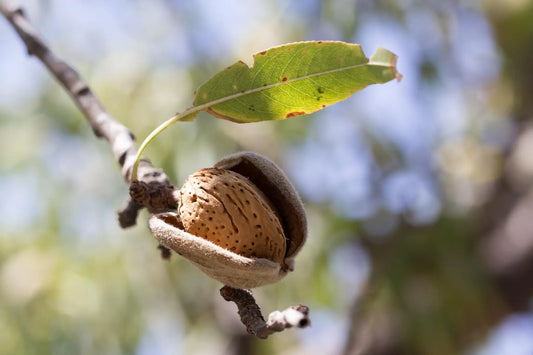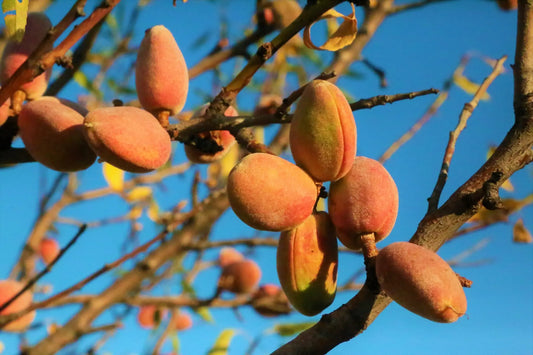-
Delivery from 10 plants to France, Switzerland and Europe
Delivery method -
Almond Tree Wholesale Supplier
About Us -
Quality Almond Tree Plants
Technical itineraries
Our range of bare-root almond trees: Professional quality at producer prices
The prices shown are our base prices for large volumes. Depending on the quantity ordered and the producers’ pricing scales, the rate may be adjusted upward. Each quote is personalized to ensure you receive a fair price.
Collapsible content
FAQ: Planting Tips
-
Ferragnes Almond Tree Plant Bare-root Scion Organic
Regular price €14,80 EURRegular priceUnit price / per -
Organic Princess Almond Tree Bare-root Scion
Regular price €14,80 EURRegular priceUnit price / per -
Organic Almond Tree Aï Scion bare-root plant
Regular price €16,30 EURRegular priceUnit price / per -
Almond Plant Robijn Scion Bare Root Organic
Regular price €16,30 EURRegular priceUnit price / per -
Texas Almond Plant Conventional Bare Root Cattail
Regular price €16,50 EURRegular priceUnit price / per -
Ferragnes Almond Plant Conventional Bare-Root Cattail
Regular price €16,50 EURRegular priceUnit price / per -
Conventional bare-root Princess Cattail Almond Plant
Regular price €16,50 EURRegular priceUnit price / per -
Conventional bare-root Almond Tree Plant
Regular price €17,50 EURRegular priceUnit price / per -
Almond Plant Avijor High and Half-Stem Diameter 6-8 cm Conventional Bare Root
Regular price €20,44 EURRegular priceUnit price / per -
Lauranne Almond Plant High and Half-Stem Diameter 6-8 cm Conventional Bare Root
Regular price €20,44 EURRegular priceUnit price / per -
Princess Almond Plant High and Half Stem diameter 6-8 cm conventional bare root
Regular price €20,44 EURRegular priceUnit price / per -
Conventional bare-root Almond Tree Plant
Regular price €21,00 EURRegular priceUnit price / per
Collection: Our range of bare-root almond trees: Professional quality at producer prices
Quick Read / The Essentials of Bare Root Almond Trees
Bare-root almond trees are an ideal option for arborists and homeowners looking to plant fruit trees at a lower cost while optimizing their recovery. Thanks to rapid rooting and optimal development, these plants guarantee vigorous growth and early production.
Amandiverse, a wholesale supplier of almond trees , offers a careful selection of bare-root plants, grown in specialized nurseries and sold at producer prices. Buying bare-root almond plants offers excellent value for money and optimal adaptability to local soil.
Bare-root almond trees offer many advantages: reduced purchasing costs, simplified logistics, and easier planting during the dormant period. However, they require rapid planting upon receipt and careful site preparation. Amandiverse, a wholesale supplier of almond trees , supports each grower in their project by providing tailored advice to ensure successful planting.
Bare-root almond trees are an economical and agronomic solution that is ideal for professionals and hobbyists alike. As a wholesale almond tree supplier , Amandiverse offers a wide range of bare-root almond plants suitable for all your projects. Discover their advantages, disadvantages, and how they compare to potted trees. If you are looking to buy almond plants , our bare-root options combine performance and attractive pricing.
Benefits of Bare Root Almond Trees for Professionals
1. Economic aspects
- Lower purchase cost : Bare-root plants are generally less expensive than potted ones, allowing for significant savings when creating or expanding an almond orchard.
- Optimized transport costs : Thanks to their simplified packaging, the volume is reduced, facilitating storage and reducing logistics costs.
2. Agronomic aspects
- Better adaptation to the soil : The roots adapt more easily to the local soil, promoting rapid and natural rooting.
- Optimal Root Development : A robust root system improves nutrient uptake and, therefore, the overall health of the tree.
- Early Production : Bare-root almond trees may begin producing almonds earlier than potted ones.
3. Practical aspects
- Ideal planting time : Planting is done during dormancy (fall-winter), reducing transplant stress.
These advantages make bare-root almond trees a particularly suitable solution for arborists wishing to purchase almond plants in large quantities at competitive prices. As a wholesale supplier of almond trees , we ensure the quality of the plants and reliable logistics.
Disadvantages of bare root almond trees
- Limited planting window : They should be planted between October and February, during the vegetative rest period.
- Increased fragility : The exposed roots are more sensitive to dehydration and shocks during handling.
- Need for rapid planting : They must be planted immediately after receipt to avoid any damage to the roots.
Although these drawbacks represent challenges, they are easily managed with good organization. Calling on Amandiverse , your wholesale almond tree supplier , guarantees you tailor-made support to make your project a success, whether it is a small plantation or a large orchard.
Comparison with potted plants
Benefits of Potted Plants
- Year-round availability : Potted almond trees can be purchased and planted at any time of year.
- Planting flexibility : Fewer time constraints for planting.
- Immediate assessment : The visual condition (foliage, structure) of the tree can be observed at the time of purchase.
Disadvantages of potted plants
- Higher Cost : Potted almond trees are generally more expensive than bare-root ones.
- Risk of root bun : Roots can curl in the pot, compromising their future development.
- Slower adaptation to the soil : Roots take longer to establish themselves and fully exploit the resources of their new environment.
Although potted plants offer more flexibility, bare root almond trees remain the most economical and efficient option for professionals wishing to purchase almond plants in large volumes through a wholesale almond supplier .
Implications for planting organization
For bare root almond trees
- Strict planning : It is crucial to plan planting during the dormant period (October-February).
- Ground preparation : Make sure the ground is ready before receiving the plants for quick planting.
- Rigorous logistics : Reception, storage (root humidity) and planting must take place within a short timeframe.
For potted almond trees
- Increased flexibility : Planting can take place virtually year-round.
- Fewer time constraints : Plants can be stored temporarily before planting.
With our expertise as a wholesale almond tree supplier , Amandiverse helps you plan your plantings effectively. We offer tailored advice to help you succeed when you decide to buy almond trees .
Why choose Amandiverse for your bare-root almond trees?
- Professional quality : Our bare-root trees come from specialized nurseries, a guarantee of robustness and productivity.
- Direct producer prices : Competitive prices for individuals and professionals.
- Fast and secure delivery : Optimized packaging to protect the roots throughout transport.
- Personalized technical advice : We support you in choosing varieties, preparing the soil and ensuring the success of your planting.
As a wholesale almond tree supplier , Amandiverse guarantees you high-quality bare-root plants . If you are looking to buy almond plants that are both economical and high-performing, we are your trusted partner.
FAQ
-
What are the benefits of bare root almond trees?
- Reduced purchase cost, rapid adaptation to the soil and potentially earlier production.
-
When can you plant bare-root almond trees?
- Between October and February, during winter dormancy.
-
What are the main disadvantages of bare root trees?
- They must be planted quickly after receipt and are more sensitive to dehydration and handling.
-
How to properly prepare the soil for planting?
- Ensure good drainage, loosen the soil and, if necessary, add compost or manure.
-
What is the difference between bare-root and potted almond trees?
- Bare roots are cheaper and adapt more quickly, while potted trees offer more flexibility but cost more.
Conclusion
Bare-root almond trees are a cost-effective and efficient solution for any tree project. Their rapid adaptation to the soil, low cost, and early fruiting potential make them a preferred choice for creating or expanding orchards. At Amandiverse , we offer a selection of professional-quality bare-root almond trees at producer prices , as well as personalized support to maximize your chances of success. If you are looking to buy almond plants , trust our expertise as a wholesale almond tree supplier .
To summarize: Bare-root almond trees
Choosing a bare-root almond tree is a cost-effective and efficient solution for planting an orchard. Thanks to rapid rooting and improved nutrient absorption, these plants ensure efficient recovery and optimized fruit set.
Amandiverse, a wholesale almond tree supplier , offers bare-root plants from specialist nurseries, guaranteeing robustness and productivity. Whether you are looking to buy almond plants for a small plantation or a large-scale project, our offer guarantees excellent value for money.
Our commitments are based on three essential pillars: rigorous variety selection, direct producer prices, and personalized technical support. By choosing Amandiverse, a wholesale almond supplier , you benefit from quality service and expert support to ensure the success of your plantation.
Trusting Amandiverse, wholesale supplier of almond trees , means opting for controlled planting, a productive orchard and superior quality plants, suitable for all types of projects.





